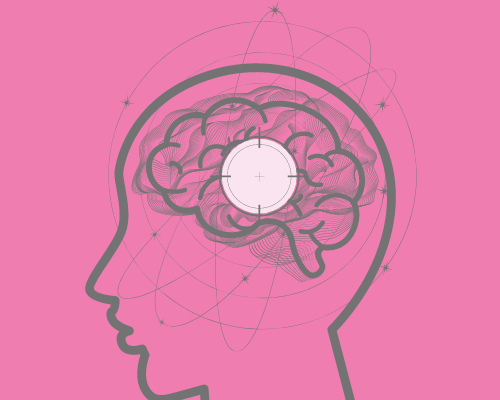Our bodies are usually equipped to handle the affect of stress in small short bursts.
When that stress becomes long term, it can have some serious effects on your body.
Musculoskeletal system

When the body is stressed, muscles tense up. Muscle tension is almost a reflex reaction to stress—the body’s way of guarding against injury and pain.
With the affect of stress, the muscles tense up all at once, and then release their tension when the stress passes. Chronic stress causes the muscles in the body to be in a more or less constant state of guardedness. When muscles are taut and tense for long periods of time, this may trigger other reactions of the body and even promote stress-related disorders.
For example, both tension-type headache and migraine headache are associated with chronic muscle tension in the area of the shoulders, neck and head.
Musculoskeletal pain in the low back and upper extremities has also been linked to stress, especially job stress.
Millions of individuals suffer from chronic painful conditions secondary to musculoskeletal disorders. Often, but not always, there may be an injury that sets off the chronic painful state. What determines whether or not an injured person goes on to suffer from chronic pain is how they respond to the injury. Individuals who are fearful of pain and re-injury, and who seek only a physical cause and cure for the injury, generally have a worse recovery than individuals who maintain a certain level of moderate, physician-supervised activity. Muscle tension, and eventually, muscle atrophy due to disuse of the body, all promote chronic, stress-related musculoskeletal conditions.
Relaxation techniques and other stress-relieving activities and therapies have been shown to effectively reduce muscle tension, decrease the incidence of certain stress-related disorders, such as headache, and increase a sense of well-being. For those who develop chronic pain conditions, stress-relieving activities have been shown to improve mood and daily function.
Respiratory system

The respiratory system supplies oxygen to cells and removes carbon dioxide waste from the body. Air comes in through the nose and goes through the larynx in the throat, down through the trachea, and into the lungs through the bronchi. The bronchioles then transfer oxygen to red blood cells for circulation.
The affect of stress and strong emotions can present with respiratory symptoms, such as shortness of breath and rapid breathing, as the airway between the nose and the lungs constricts. For people without respiratory disease, this is generally not a problem as the body can manage the additional work to breathe comfortably, but psychological stressors can exacerbate breathing problems for people with pre-existing respiratory diseases such as asthma and chronic obstructive pulmonary disease (COPD; includes emphysema and chronic bronchitis).
Some studies show that an acute stress—such as the death of a loved one—can actually trigger asthma attacks. In addition, the rapid breathing—or hyperventilation—caused by stress can bring on a panic attack in someone prone to panic attacks.
Working with a psychologist to develop relaxation, breathing, and other cognitive behavioral strategies can help.
Cardiovascular system

The heart and blood vessels comprise the two elements of the cardiovascular system that work together in providing nourishment and oxygen to the organs of the body. The activity of these two elements is also coordinated in the body’s response to stress. Acute stress—stress that is momentary or short-term such as meeting deadlines, being stuck in traffic or suddenly slamming on the brakes to avoid an accident—causes an increase in heart rate and stronger contractions of the heart muscle, with the stress hormones—adrenaline, noradrenaline, and cortisol—acting as messengers for these effects.
In addition, the blood vessels that direct blood to the large muscles and the heart dilate, thereby increasing the amount of blood pumped to these parts of the body and elevating blood pressure. This is also known as the fight or flight response. Once the acute stress episode has passed, the body returns to its normal state.
Chronic stress, or the affect of stress stress experienced over a prolonged period of time, can contribute to long-term problems for heart and blood vessels. The consistent and ongoing increase in heart rate, and the elevated levels of stress hormones and of blood pressure, can take a toll on the body. This long-term ongoing stress can increase the risk for hypertension, heart attack, or stroke.
Repeated acute stress and persistent chronic stress may also contribute to inflammation in the circulatory system, particularly in the coronary arteries, and this is one pathway that is thought to tie stress to heart attack. It also appears that how a person responds to stress can affect cholesterol levels.
The risk for heart disease associated with stress appears to differ for women, depending on whether the woman is premenopausal or postmenopausal. Levels of estrogen in premenopausal women appears to help blood vessels respond better during stress, thereby helping their bodies to better handle stress and protecting them against heart disease. Postmenopausal women lose this level of protection due to loss of estrogen, therefore putting them at greater risk for the effects of stress on heart disease.
Endocrine system

When someone perceives a situation to be challenging, threatening, or uncontrollable, the brain initiates a cascade of events involving the hypothalamic-pituitary-adrenal (HPA) axis, which is the primary driver of the endocrine stress response. This ultimately results in an increase in the production of steroid hormones called glucocorticoids, which include cortisol, often referred to as the “stress hormone”.
The HPA axis
During times of stress, the hypothalamus, a collection of nuclei that connects the brain and the endocrine system, signals the pituitary gland to produce a hormone, which in turn signals the adrenal glands, located above the kidneys, to increase the production of cortisol.
Cortisol increases the level of energy fuel available by mobilising glucose and fatty acids from the liver. Cortisol is normally produced in varying levels throughout the day, typically increasing in concentration upon awakening and slowly declining throughout the day, providing a daily cycle of energy.
During a stressful event, an increase in cortisol can provide the energy required to deal with prolonged or extreme challenge.
Stress and health
Glucocorticoids, including cortisol, are important for regulating the immune system and reducing inflammation. While this is valuable during stressful or threatening situations where injury might result in increased immune system activation, chronic stress can result in impaired communication between the immune system and the HPA axis.
This impaired communication has been linked to the future development of numerous physical and mental health conditions, including chronic fatigue, metabolic disorders (e.g., diabetes, obesity), depression, and immune disorders.
Gastrointestinal system

The gut has hundreds of millions of neurons which can function fairly independently and are in constant communication with the brain—explaining the ability to feel “butterflies” in the stomach. Stress can affect this brain-gut communication, and may trigger pain, bloating, and other gut discomfort to be felt more easily. The gut is also inhabited by millions of bacteria which can influence its health and the brain’s health, which can impact the ability to think and affect emotions.
The affect of stress is associated with changes in gut bacteria which in turn can influence mood. Thus, the gut’s nerves and bacteria strongly influence the brain and vice versa.
Early life stress can change the development of the nervous system as well as how the body reacts to stress. These changes can increase the risk for later gut diseases or dysfunctioning.
Esophagus
When stressed, individuals may eat much more or much less than usual. More or different foods, or an increase in the use of alcohol or tobacco, can result in heartburn or acid reflux. Stress or exhaustion can also increase the severity of regularly occurring heartburn pain. A rare case of spasms in the esophagus can be set off by intense stress and can be easily mistaken for a heart attack.
Stress also may make swallowing foods difficult or increase the amount of air that is swallowed, which increases burping, gassiness, and bloating.
Stomach
Stress may make pain, bloating, nausea, and other stomach discomfort felt more easily. Vomiting may occur if the stress is severe enough. Furthermore, stress may cause an unnecessary increase or decrease in appetite. Unhealthy diets may in turn deteriorate one’s mood.
Contrary to popular belief, stress does not increase acid production in the stomach, nor causes stomach ulcers. The latter are actually caused by a bacterial infection. When stressed, ulcers may be more bothersome.
Bowel
Stress can also make pain, bloating, or discomfort felt more easily in the bowels. It can affect how quickly food moves through the body, which can cause either diarrhea or constipation. Furthermore, stress can induce muscle spasms in the bowel, which can be painful.
Stress can affect digestion and what nutrients the intestines absorb. Gas production related to nutrient absorption may increase.
The intestines have a tight barrier to protect the body from (most) food related bacteria. Stress can make the intestinal barrier weaker and allow gut bacteria to enter the body. Although most of these bacteria are easily taken care of by the immune system and do not make us sick, the constant low need for inflammatory action can lead to chronic mild symptoms.
Stress especially affects people with chronic bowel disorders, such as inflammatory bowel disease or irritable bowel syndrome. This may be due to the gut nerves being more sensitive, changes in gut microbiota, changes in how quickly food moves through the gut, and/or changes in gut immune responses.
Nervous system

The nervous system has several divisions: the central division involving the brain and spinal cord and the peripheral division consisting of the autonomic and somatic nervous systems.
The autonomic nervous system has a direct role in physical response to stress and is divided into the sympathetic nervous system (SNS), and the parasympathetic nervous system (PNS). When the body is stressed, the SNS contributes to what is known as the “fight or flight” response. The body shifts its energy resources toward fighting off a life threat, or fleeing from an enemy.
The SNS signals the adrenal glands to release hormones called adrenalin (epinephrine) and cortisol. These hormones, together with direct actions of autonomic nerves, cause the heart to beat faster, respiration rate to increase, blood vessels in the arms and legs to dilate, digestive process to change and glucose levels (sugar energy) in the bloodstream to increase to deal with the emergency.
The SNS response is fairly sudden in order to prepare the body to respond to an emergency situation or acute stress—short term stressors. Once the crisis is over, the body usually returns to the pre-emergency, unstressed state. This recovery is facilitated by the PNS, which generally has opposing effects to the SNS. But PNS over-activity can also contribute to stress reactions, for example, by promoting bronchoconstriction (e.g., in asthma) or exaggerated vasodilation and compromised blood circulation.
Both the SNS and the PNS have powerful interactions with the immune system, which can also modulate stress reactions. The central nervous system is particularly important in triggering stress responses, as it regulates the autonomic nervous system and plays a central role in interpreting contexts as potentially threatening.
Chronic stress, experiencing stressors over a prolonged period of time, can result in a long-term drain on the body. As the autonomic nervous system continues to trigger physical reactions, it causes a wear-and-tear on the body. It’s not so much what chronic stress does to the nervous system, but what continuous activation of the nervous system does to other bodily systems that become problematic.
Male reproductive system

The male reproductive system is influenced by the nervous system. The parasympathetic part of the nervous system causes relaxation whereas the sympathetic part causes arousal. In the male anatomy, the autonomic nervous system, also known as the fight or flight response, produces testosterone and activates the sympathetic nervous system which creates arousal.
Stress causes the body to release the hormone cortisol, which is produced by the adrenal glands. Cortisol is important to blood pressure regulation and the normal functioning of several body systems including cardiovascular, circulatory, and male reproduction. Excess amounts of cortisol can affect the normal biochemical functioning of the male reproductive system.
Sexual desire
Chronic stress, ongoing stress over an extended period of time, can affect testosterone production resulting in a decline in sex drive or libido, and can even cause erectile dysfunction or impotence.
Reproduction
Chronic stress can also negatively impact sperm production and maturation, causing difficulties in couples who are trying to conceive. Researchers have found that men who experienced two or more stressful life events in the past year had a lower percentage of sperm motility (ability to swim) and a lower percentage of sperm of normal morphology (size and shape), compared with men who did not experience any stressful life events.
Diseases of the reproductive system
When stress affects the immune system, the body can become vulnerable to infection. In the male anatomy, infections to the testes, prostate gland, and urethra, can affect normal male reproductive functioning.
Female reproductive system

Menstruation
Stress may affect menstruation among adolescent girls and women in several ways. For example, high levels of stress may be associated with absent or irregular menstrual cycles, more painful periods, and changes in the length of cycles.
Sexual desire
Women juggle personal, family, professional, financial, and a broad range of other demands across their life span. Stress, distraction, fatigue, etc., may reduce sexual desire—especially when women are simultaneously caring for young children or other ill family members, coping with chronic medical problems, feeling depressed, experiencing relationship difficulties or abuse, dealing with work problems, etc.
Pregnancy
Stress can have significant impact on a woman’s reproductive plans. Stress can negatively impact a woman’s ability to conceive, the health of her pregnancy, and her postpartum adjustment. Depression is the leading complication of pregnancy and postpartum adjustment.
Excess stress increases the likelihood of developing depression and anxiety during this time. Maternal stress can negatively impact fetal and ongoing childhood development and disrupt bonding with the baby in the weeks and months following delivery.
Premenstrual syndrome
Stress may make premenstrual symptoms worse or more difficult to cope with and premenses symptoms may be stressful for many women. These symptoms include cramping, fluid retention and bloating, negative mood (feeling irritable and “blue”) and mood swings.
Menopause
As menopause approaches, hormone levels fluctuate rapidly. These changes are associated with anxiety, mood swings, and feelings of distress. Thus menopause can be a stressor in and of itself. Some of the physical changes associated with menopause, especially hot flushes, can be difficult to cope with.
Furthermore, emotional distress may cause the physical symptoms to be worse. For example, women who are more anxious may experience an increased number of hot flashes and/or more severe or intense hot flashes.
Diseases of the reproductive system
When stress is high, there is increased chance of exacerbation of symptoms of reproductive disease states, such as herpes simplex virus or polycystic ovarian syndrome. The diagnosis and treatment of reproductive cancers can cause significant stress, which warrants additional attention and support.
Images and Credit APA
APA




